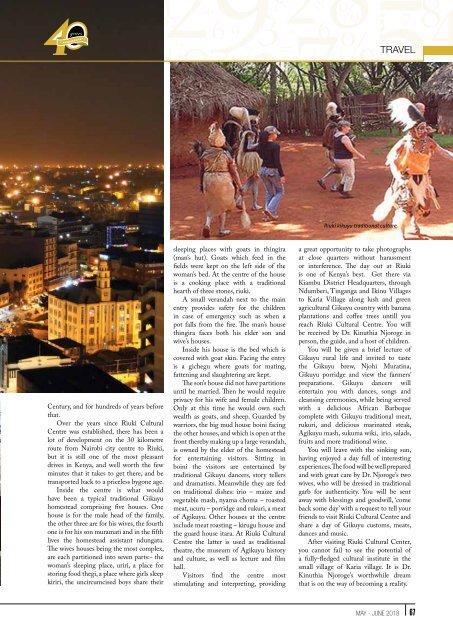May-June-issue
Create successful ePaper yourself
Turn your PDF publications into a flip-book with our unique Google optimized e-Paper software.
TRAVEL<br />
Riuki kikuyu traditional culture.<br />
Century, and for hundreds of years before<br />
that.<br />
Over the years since Riuki Cultural<br />
Centre was established, there has been a<br />
lot of development on the 30 kilometre<br />
route from Nairobi city centre to Riuki,<br />
but it is still one of the most pleasant<br />
drives in Kenya, and well worth the few<br />
minutes that it takes to get there, and be<br />
transported back to a priceless bygone age.<br />
Inside the centre is what would<br />
have been a typical traditional Gikuyu<br />
homestead comprising five houses. One<br />
house is for the male head of the family,<br />
the other three are for his wives, the fourth<br />
one is for his son muramati and in the fifth<br />
lives the homestead assistant ndungata.<br />
The wives houses being the most complex,<br />
are each partitioned into seven parts:- the<br />
woman’s sleeping place, uriri, a place for<br />
storing food thegi, a place where girls sleep<br />
kiriri, the uncircumcised boys share their<br />
sleeping places with goats in thingira<br />
(man’s hut). Goats which feed in the<br />
fields were kept on the left side of the<br />
woman’s bed. At the centre of the house<br />
is a cooking place with a traditional<br />
hearth of three stones, riuki.<br />
A small verandah next to the main<br />
entry provides safety for the children<br />
in case of emergency such as when a<br />
pot falls from the fire. The man’s house<br />
thingira faces both his elder son and<br />
wive’s houses.<br />
Inside his house is the bed which is<br />
covered with goat skin. Facing the entry<br />
is a gichegu where goats for mating,<br />
fattening and slaughtering are kept.<br />
The son’s house did not have partitions<br />
until he married. Then he would require<br />
privacy for his wife and female children.<br />
Only at this time he would own such<br />
wealth as goats, and sheep. Guarded by<br />
warriors, the big mud house boini facing<br />
the other houses, and which is open at the<br />
front thereby making up a large verandah,<br />
is owned by the elder of the homestead<br />
for entertaining visitors. Sitting in<br />
boini the visitors are entertained by<br />
traditional Gikuyu dancers, story tellers<br />
and dramatists. Meanwhile they are fed<br />
on traditional dishes: irio – maize and<br />
vegetable mash, nyama choma – roasted<br />
meat, ucuru – porridge and rukuri, a meat<br />
of Agikuyu. Other houses at the centre<br />
include meat roasting – kirugu house and<br />
the guard house itara. At Riuki Cultural<br />
Centre the latter is used as traditional<br />
theatre, the museum of Agikuyu history<br />
and culture, as well as lecture and film<br />
hall.<br />
Visitors find the centre most<br />
stimulating and interpreting, providing<br />
a great opportunity to take photographs<br />
at close quarters without harassment<br />
or interference. The day out at Riuki<br />
is one of Kenya’s best. Get there via<br />
Kiambu District Headquarters, through<br />
Ndumberi, Tinganga and Ikinu Villages<br />
to Karia Village along lush and green<br />
agricultural Gikuyu country with banana<br />
plantations and coffee trees untill you<br />
reach Riuki Cultural Centre. You will<br />
be received by Dr. Kinuthia Njoroge in<br />
person, the guide, and a host of children.<br />
You will be given a brief lecture of<br />
Gikuyu rural life and invited to taste<br />
the Gikuyu brew, Njohi Muratina,<br />
Gikuyu porridge and view the farmers’<br />
preparations. Gikuyu dancers will<br />
entertain you with dances, songs and<br />
cleansing ceremonies, while being served<br />
with a delicious African Barbeque<br />
complete with Gikuyu traditional meat,<br />
rukuri, and delicious marinated steak,<br />
Agikuyu mash, sukuma wiki, irio, salads,<br />
fruits and more traditional wine.<br />
You will leave with the sinking sun,<br />
having enjoyed a day full of interesting<br />
experiences. The food will be well prepared<br />
and with great care by Dr. Njoroge’s two<br />
wives, who will be dressed in traditional<br />
garb for authenticity. You will be sent<br />
away with blessings and goodwill, ‘come<br />
back some day’ with a request to tell your<br />
friends to visit Riuki Cultural Centre and<br />
share a day of Gikuyu customs, meats,<br />
dances and music.<br />
After visiting Riuki Cultural Center,<br />
you cannot fail to see the potential of<br />
a fully-fledged cultural institute in the<br />
small village of Karia village. It is Dr.<br />
Kinuthia Njoroge’s worthwhile dream<br />
that is on the way of becoming a reality.<br />
MAY - JUNE 2018 67

















